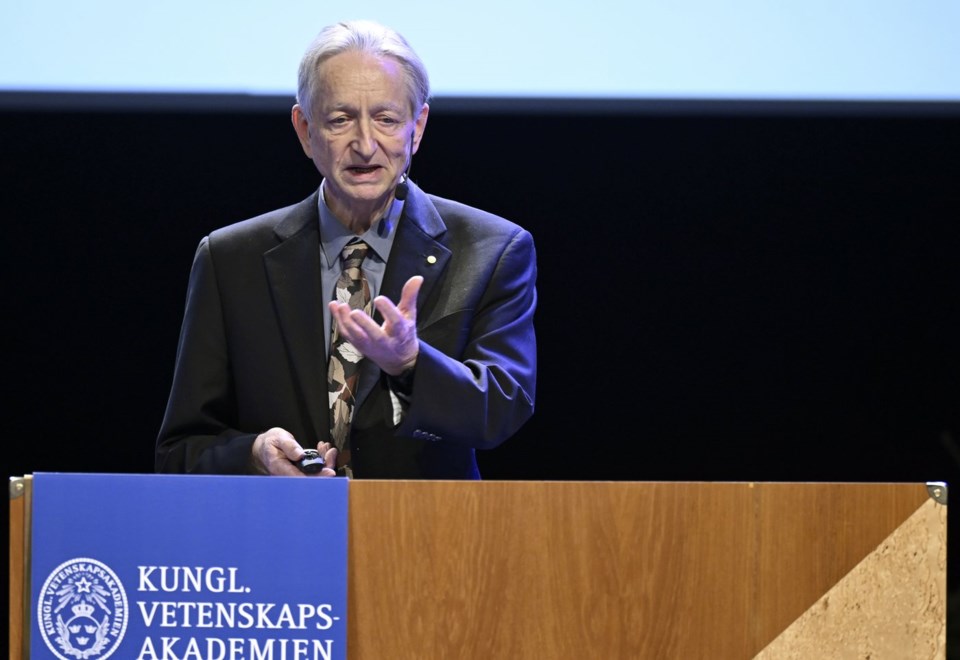Geoffrey Hinton says he doesn’t regret the work he did that laid the foundations of artificial intelligence, but wishes he thought of safety sooner.
The British-Canadian computer scientist often called the godfather of AI said over the weekend that he doesn’t have any guilty regret, which he said is when someone has done something when they know they shouldn’t have at the time.
“In the same circumstances, I would do the same again,” he said of his research, which dates back to the 1980s and has formed the underpinnings of AI.
“However, I think it might have been unfortunate in that we're going to get superintelligence faster than I thought, and I wish I'd thought about safety earlier.”
Superintelligence surpasses the abilities of even the smartest humans. Hinton thinks it could arrive in the next five to 20 years and humanity may have to “worry seriously about how we stay in control.”
Hinton made his prediction during a press conference in Stockholm, where he is due to a receive the Nobel Prize in physics on Tuesday.
Hinton, a University of Toronto professor emeritus, and co-laureate John Hopfield, a Princeton University professor, are being given the prize because they developed some of the foundations of machine learning, a computer science that helps AI mimic how humans learn.
Hinton kicked off his Nobel week on Saturday with the press conference, where he appeared with laureates in chemistry and economics and was asked about AI safety and regulation.
Hinton left a job at Google last year to speak more freely about the technology's dangers, which he has said could include job losses, bias and discrimination, echo chambers, fake news, battle robots and even the end of humanity.
On Saturday, he said he considers lethal autonomous weapons to be a short-term danger.
"There isn't going to be any regulation there," he said, pointing out that European regulations have a specific clause exempting military use of AI from restrictions.
"Governments are unwilling to regulate themselves, when it comes to lethal autonomous weapon, and there is an arms race going on between all the major arms suppliers like the United States, China, Russia, Britain, Israel and possibly even Sweden, though I don't know."
A day later, Hinton put his concerns about AI aside to deliver a lecture with Hopfield explaining the research that earned them their Nobel.
"Today I am going to do something very foolish." Hinton said in introducing his portion of the pair's hour-long speech.
"I am going to try and describe a complicated technical idea for a general audience without using any equations."
The audience chuckled.
The talk began with Hopfield describing a network he invented that could store and reconstruct images in data.
It led Hinton to later create the Boltzmann machine, which learns from examples, rather than instructions, and when trained, can recognize familiar characteristics in information, even if it has not seen that data before.
Hinton said students in his lab and others run by fellow AI pioneers Yoshua Bengio and Yann LeCun were using Boltzmann machines to pre-train neural networks — machine learning models that make decisions in a manner similar to the human brain — between 2006 and 2011.
By 2009, two of Hinton's students had showed the technique "worked a little bit better than the best existing techniques for recognizing fragments of phonemes in speech and that then changed the speech recognition community," Hinton said.
Phonemes are small units of sound that can change the meaning of a word.
Google later began working on technology based on Hinton's discoveries and "suddenly the speech recognition on the Android got a lot better."
Even though the kind of Boltzmann machines Hinton was working with back then are no longer used in the same ways as he used them, he said "they allowed us to make the transition from thinking that deep neural networks would never work to seeing that deep neural networks actually could be made to work."
Nobel Week will continue Monday with a discussion about the future of health before an awards ceremony and banquet is held Tuesday.
Hinton has said he will donate a portion of the prize money — equivalent to about C$1.45 million — he and Hopfield will be given to Water First, which is working to boost Indigenous access to water, and a charity supporting neurodiverse young adults.
He is also reportedly due to donate an early Boltzmann chip to the Nobel Prize Museum.
The Nobel is not the only prize Hinton scooped up this month. On Friday, he, Bengio, LeCun, Chinese-American computer scientist Fei-Fei Li and Nvidia founder Jensen Huang, were awarded the Vin Future Prize, a US$3 million prize for science breakthroughs in a ceremony in Vietnam.
Hinton, Bengio and LeCun previously won the A.M. Turing Award, known as the Nobel Prize of computing, together in 2018.
This report by The Canadian Press was first published on Dec. 8, 2024.
Tara Deschamps, The Canadian Press


